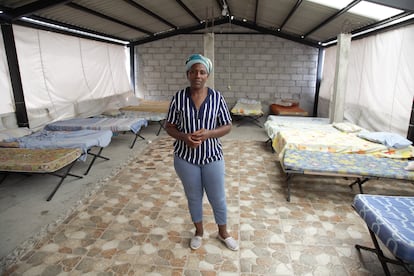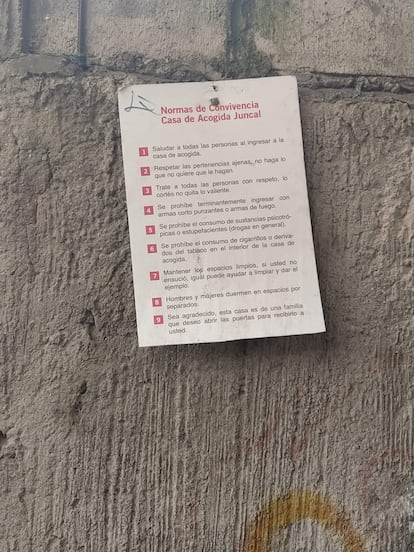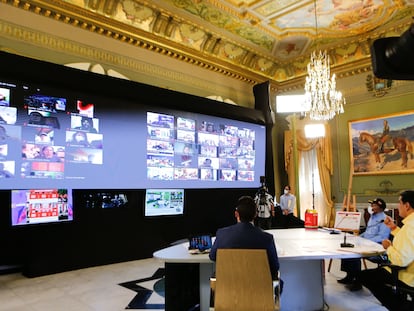The fruit vendor who has provided refuge for 10,000 Venezuelans
For the past four years, Carmen Carcelén has been working tirelessly to offer free food and shelter in her home in El Juncal, Ecuador to citizens fleeing the neighboring country


In the yard of Carmen Carcelén’s home, there are stacks of white plastic chairs and mattresses. A television playing cartoons can be heard in the background. On one of the walls of the home, made from cement, are the new rules of Casa de Acogida Juncal, or Juncal Shelter – “Be grateful, this is the home of a family who wants to open its doors to you.”
Carcelén sells fruit and vegetables in Ipiales, a Colombian city close to the border of Ecuador. But for the past four years, she has also been working tirelessly to provide a free refuge for Venezuelans fleeing their country who pass through El Juncal, a small Ecuadorian town of just 2,500 people. All without financial support. “We never thought that my home would turn into a shelter, we thought only in helping them,” says Carcelén, remembering how the project began.
After returning from the fruit market one day, she and her husband came across 11 young Venezuelans, one of whom had fainted, and who were begging for food. They became the first of 10,000 Venezuelans Carcelén has sheltered for free since 2017, according to the high commissioner for the United Nations Refugee Agency (UNHCR). Most of these migrants flee Venezuela on foot, walking until they reach Peru or Chile, while some decide to stay in Ecuador.
“I have had to return to my past to understand why I do all this,” says an emotional Carcelén from her living room. When she was just 10 years old, her father, a wealthy vendor with alcohol problems, threw her clothes on the street and kicked her out of home. He had also been physically abusing her since she was five – the scars of which she still bears on her arm and throat. Carcelén decided not to go back and set out on foot to find her brother’s home. “I slept on the street, in a park, because I was a very young girl, I couldn’t find the address easily,” she explains. “Nobody helped me and that’s why I am always going back in time and doing what other people didn’t do for me. That’s my reasoning.”
"Mis hijos ven lo que yo hago y sé que alguno de ellos va a ser generoso. Y eso es lo único que importa en la vida".
— ACNUR, la Agencia de la ONU para los Refugiados (@ACNURamericas) March 10, 2019
En Imbabura, Ecuador, Carmen alberga en su hostal a refugiados y migrantes de Venezuela. Lo hace sin recibir ningún pago a cambio.#DíadelaMujer pic.twitter.com/2DmV20zTSF
“‘My children see what I do and I know that some of them are going to generous. And that is the only thing that matters in life.’ In Imbabura, Ecuador, Carmen shelters migrants and refugees from Venezuela. She does this without receiving any payment in exchange.”
Carcelén travels to the Ipiales market to sell fruit and vegetables every day except Sundays and Thursdays. By doing so, she makes enough money to live and maintain the shelter in her three-story home, which features an industrial kitchen to provide food for anyone who needs it. But she admits that seeing so many people abandoned often makes her cry. “It’s the best thing I have done in my life,” says Carcelén, in reference to the shelter, which has become the center of her world.
And she doesn’t work alone – her children also chip in. “We are a great team,” she says proudly. Carcelén has eight children – six biological sons and two daughters she adopted after their respective mothers passed away. Each one, from the 12-year-old to the 30-year-old, has a specific role: cooking, washing dishes and registering the names of the new arrivals. “If someone arrives injured, they even take them to the doctor, or find them clothes, shoes… If I go away, I know I don’t have to worry about anything. I take my hat off to them,” she says.

When Carcelén first set up Juncal Shelter, she received a lot of help from neighbors, who donated rice, clothes and shoes. But this slowly stopped coming. When the coronavirus pandemic hit, the Jesuits provided support for the first six months, covering 70% of the food expenses. UNHCR also provided hygiene and cleaning kits to the new arrivals at the shelter. “During the days when everything was closed and you saw lots of people walking, it seemed like we were watching zombies pass by, with lots of sick children and people on the street,” she says, adding that Juncal Shelter was only closed for eight days.
In just one day, the shelter has been able to provide food to 500 people and a place to sleep for 138. The home, however, remains peaceful, which Carcelén attributes to the fact that the rules are strictly followed: weapons, drugs and fighting are prohibited. “In my home, no one is graded or classified. Food is given to the good guys and the bad. I’m not God to judge them,” she says. Indeed, it still upsets her that political leaders in the region have accused her in the past of using the shelter as a cover to traffic humans or drugs.
Carcelén, who is a member of her church’s choir and is deeply religious, enjoys the constant human contact and speaking with the “travelers” who arrive at her door. She says she tells them the story of the first “migrants” on Earth, Joseph and Mary, were also denied shelter. “Perhaps around 70% of Venezuelans cannot be helped, but there is another 30% – the children and men who arrive here walking, who can be helped, and that gives hope to the other 70%,” she says.
English version by Melissa Kitson.
Tu suscripción se está usando en otro dispositivo
¿Quieres añadir otro usuario a tu suscripción?
Si continúas leyendo en este dispositivo, no se podrá leer en el otro.
FlechaTu suscripción se está usando en otro dispositivo y solo puedes acceder a EL PAÍS desde un dispositivo a la vez.
Si quieres compartir tu cuenta, cambia tu suscripción a la modalidad Premium, así podrás añadir otro usuario. Cada uno accederá con su propia cuenta de email, lo que os permitirá personalizar vuestra experiencia en EL PAÍS.
¿Tienes una suscripción de empresa? Accede aquí para contratar más cuentas.
En el caso de no saber quién está usando tu cuenta, te recomendamos cambiar tu contraseña aquí.
Si decides continuar compartiendo tu cuenta, este mensaje se mostrará en tu dispositivo y en el de la otra persona que está usando tu cuenta de forma indefinida, afectando a tu experiencia de lectura. Puedes consultar aquí los términos y condiciones de la suscripción digital.
More information
Archived In
Últimas noticias
Most viewed
- Sinaloa Cartel war is taking its toll on Los Chapitos
- Oona Chaplin: ‘I told James Cameron that I was living in a treehouse and starting a permaculture project with a friend’
- Reinhard Genzel, Nobel laureate in physics: ‘One-minute videos will never give you the truth’
- Why the price of coffee has skyrocketed: from Brazilian plantations to specialty coffee houses
- Silver prices are going crazy: This is what’s fueling the rally










































